I have a tensor A with size [batchSize,2,2,2] where batchSize is a placeholder. In a custom layer, I would like to map each value of this tensor to the closest value in a list c with length n. The list is my codebook and I would like to quantize each value in the tensor based on this codebook; i.e. find the closest value to each tensor value in the list and replace the tensor value with that.
I could not figure out a 'clean' tensor operation that will quickly do that. I can not loop over the batchSize. Is there a method to do this in Tensorflow?
Asked
Active
Viewed 687 times
0
deepsy
- 15
- 2
-
Can you give an example of your codebook? Maybe you can use `https://www.tensorflow.org/api_docs/python/tf/quantization/quantize` if it is a standard min-max quantization. Or if you have some key-vale pairs, you might first do some normalization then perform a key/value lookup via a `tf.contrib.lookup.HashTable`. – greeness May 27 '19 at 09:20
-
@greeness Thank you for your reply. `tf.quantization.quantize` does not work for me since my quantization values are non-uniform. I think hash table is not suitable for me either since I randomly draw the values of tensor `A` from Gaussian distribution. Codebook `c` vector includes the non-uniform quantized values from the Gaussian distribution with length `100`. As a result, I'm mapping the values drawn randomly from the continuous distribution to quantized values. – deepsy May 27 '19 at 18:48
1 Answers
0
If I understand correctly, this is doable with tf.HashTable. As an illustration, I used a normal distribution with mean=0, stddev=4.
a = tf.random.normal(
shape = [batch, 2, 2, 2],
mean=0.0,
stddev=4
)
And I used a quantization with only 5 buckets (see the figure marked with number 0, 1, 2, 3, 4). This is extensible to any length n. Note I intentionally made the buckets have variable length.
My codebook is therefore:
a <= -2 -> bucket 4
-2 < a < -0.5 -> bucket 3
-0.5 <= a < 0.5 -> bucket 0
0.5 <= a < 2.5 -> bucket 1
a >= 2.5 -> bucket 2
The idea is to pre-create a key/value mapping from a scaled a to the bucket number. (the number of <key,value> pairs is dependent on the input granularity you need. Here I scaled by 10). Below is the code to initialize the mapping table and the produced mapping (input scaled by 10).
# The boundary is chosen based on that we clip by min=-4, max=4.
# after scaling, the boundary becomes -40 and 40.
keys = range(-40, 41)
values = []
for k in keys:
if k <= -20:
values.append(4)
elif k < -5:
values.append(3)
elif k < 5:
values.append(0)
elif k < 25:
values.append(1)
else:
values.append(2)
for (k, v) in zip(keys, values):
print ("%2d -> %2d" % (k, v))
-40 -> 4
-39 -> 4
...
-22 -> 4
-21 -> 4
-20 -> 4
-19 -> 3
-18 -> 3
...
-7 -> 3
-6 -> 3
-5 -> 0
-4 -> 0
...
3 -> 0
4 -> 0
5 -> 1
6 -> 1
...
23 -> 1
24 -> 1
25 -> 2
26 -> 2
...
40 -> 2
batch = 3
a = tf.random.normal(
shape = [batch, 2, 2, 2],
mean=0.0,
stddev=4,
dtype=tf.dtypes.float32
)
clip_a = tf.clip_by_value(a, clip_value_min=-4, clip_value_max=4)
SCALE = 10
scaled_clip_a = tf.cast(clip_a * SCALE, tf.int32)
table = tf.contrib.lookup.HashTable(
tf.contrib.lookup.KeyValueTensorInitializer(keys, values), -1)
quantized_a = tf.reshape(
table.lookup(tf.reshape(scaled_clip_a, [-1])),
[batch, 2, 2, 2])
with tf.Session() as sess:
table.init.run()
a, clip_a, scaled_clip_a, quantized_a = sess.run([a, clip_a, scaled_clip_a, quantized_a])
print ('a\n%s' % a)
print ('clip_a\n%s' % clip_a)
print ('scaled_clip_a\n%s' % scaled_clip_a)
print ('quantized_a\n%s' % quantized_a)
Result:
a
[[[[-0.26980758 -5.56331968]
[ 5.04240322 -7.18292665]]
[[-7.11545467 -3.24369478]
[ 1.01861215 -0.04510783]]]
[[[-0.28768024 0.2472897 ]
[ 2.17780781 -5.79106379]]
[[ 8.45582008 4.53902292]
[ 0.138162 -6.19155598]]]
[[[-7.5134449 4.56302166]
[-0.30592337 -0.60313278]]
[[-0.06204566 3.42917275]
[-1.14547718 3.31167102]]]]
clip_a
[[[[-0.26980758 -4. ]
[ 4. -4. ]]
[[-4. -3.24369478]
[ 1.01861215 -0.04510783]]]
[[[-0.28768024 0.2472897 ]
[ 2.17780781 -4. ]]
[[ 4. 4. ]
[ 0.138162 -4. ]]]
[[[-4. 4. ]
[-0.30592337 -0.60313278]]
[[-0.06204566 3.42917275]
[-1.14547718 3.31167102]]]]
scaled_clip_a
[[[[ -2 -40]
[ 40 -40]]
[[-40 -32]
[ 10 0]]]
[[[ -2 2]
[ 21 -40]]
[[ 40 40]
[ 1 -40]]]
[[[-40 40]
[ -3 -6]]
[[ 0 34]
[-11 33]]]]
quantized_a
[[[[0 4]
[2 4]]
[[4 4]
[1 0]]]
[[[0 0]
[1 4]]
[[2 2]
[0 4]]]
[[[4 2]
[0 3]]
[[0 2]
[3 2]]]]
greeness
- 15,956
- 5
- 50
- 80
